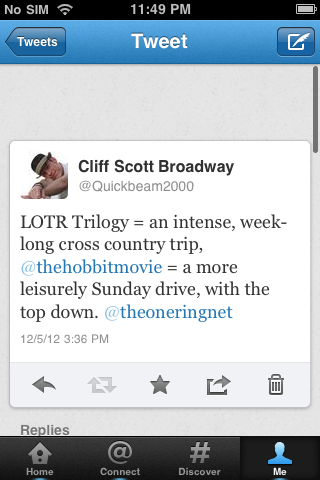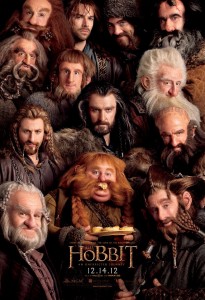 Sometimes words just pour out of me when I type. Other times, I hesitate. Reviewing THE HOBBIT: AN UNEXPECTED JOURNEY required an approach unusual for me after twelve years contributing to TheOneRing.net. I let things gestate for several days, really, so as to refine my thoughts. The first part of this review will be blissfully *spoiler free* for those who don’t want to know the big changes; but after a warning I’ll get into the nitty-gritty with loads of spoilers.
Sometimes words just pour out of me when I type. Other times, I hesitate. Reviewing THE HOBBIT: AN UNEXPECTED JOURNEY required an approach unusual for me after twelve years contributing to TheOneRing.net. I let things gestate for several days, really, so as to refine my thoughts. The first part of this review will be blissfully *spoiler free* for those who don’t want to know the big changes; but after a warning I’ll get into the nitty-gritty with loads of spoilers.
I’ve been as excited as anybody, truthfully. THE HOBBIT: AUJ has *finally* come to the big screen – envisioned by the capable hands of a crafty Kiwi director, backed up by a super-group of WETA designers, enhanced by New Zealand’s gorgeous vistas.
Jackson, a fine fellow fan of the phantasmagorical (by that I mean he’s embraced his Inner Geek like the rest of us), really brought the goods with THE LORD OF THE RINGS. Three excursions to the cinema over three years… and we quite devoured them. They were so Hobbity good. There was a bit of grousing from the balcony of hardcore book-fans (something about character and plot changes), but PJ’s vision was ultimately embraced by the majority. The fans couldn’t have been louder or more jubilant than when, during our ROTK Oscar Party, the winner for Best Picture was announced. The phrase “Trust in PJ” is one of the most common on our message boards – a roundly agreed upon sentiment.
After years of fretting the damn thing wouldn’t get made at all, indeed Bilbo has arrived! Can I get an ‘amen’ up in here? We’ve waited so long to return to the power and majesty of that LOTR Trilogy – but is THE HOBBIT: AUJ that movie? Well, yes and no (don’t you just hate that dreaded cliché in a review? Thus my hesitation before writing).
This adaptation has a slightly different vibe. This filmic HOBBIT is light-on-its-feet, less driven by harsh crises, more keen to savor a moment of literary indulgence than to rush. Hard to come up with the right analogy but on December 5th I tweeted:
The body of work J.R.R. Tolkien left us with came from different points in his life, and perhaps shows different approaches in authorship. Certainly we know the difference in tone between LOTR and its lovely prelude. “The Hobbit” was always a lighter affair – an episodic children’s novel that goes from super-quaint to superbly epic while never losing its élan. On the other hand, the War of the Ring has heavier gravity, bigger stakes. The Professor’s Trilogy hits you emotionally in a way that never leaves you. Jackson’s 3 films succeeded enough in the fidelity department to do much the same for the heartstrings.
To all of you expecting THE HOBBIT: AUJ to have major upheavals, multiple character deaths (Gandalf, Boromir), etc., the kind that left you crying and thunderstruck watching THE FELLOWSHIP OF THE RING in 2001, you can instead expect a more comfortable walking pace, with less bombast and careening around the story. I believe most fans will really enjoy it, but don’t expect lightning in a bottle twice.
I saw it projected in the regular 24fps, in 3D, having already seen 10 minutes of High Frame Rate 48fps at this summer’s CinemaCon [story here]. Read that story from April to get a whiff of how the high-frame rate technology was presented to the industry, and my first reaction to it.
The Cast really shines. Jackson’s knack for finding the right people for the part impresses still. There’s fine onscreen magic just from the thespian point of view, regardless of CGI marvels, creatures, and swooping 3D goblin tunnels. Martin Freeman is so wonderful as Bilbo Baggins, you miss him when he’s offscreen. Freeman has enough pluck to carry us forward in this trilogy, just as his character must for Thorin & Company.
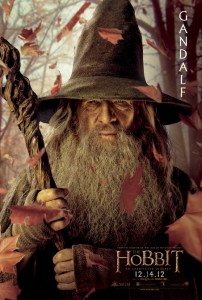 This ensemble is par-excellence! Lordy, they are so very good! Richard Armitage intensely brings to life a Thorin Oakenshield with a heavy past, exile writ on his face like iron hammers of pain. What can be said of Gandalf the Grey? …except he is perfectly encapsulated by Sir Ian McKellen, so avuncular and wise. The man was born for the part. The Company of Dwarves are funny, amiable, and fill the camera with constant activity. They are strongly designed and individualized by their styles, yet half of them get more dialogue than others it seems. Maybe this will balance out more in future installments.
This ensemble is par-excellence! Lordy, they are so very good! Richard Armitage intensely brings to life a Thorin Oakenshield with a heavy past, exile writ on his face like iron hammers of pain. What can be said of Gandalf the Grey? …except he is perfectly encapsulated by Sir Ian McKellen, so avuncular and wise. The man was born for the part. The Company of Dwarves are funny, amiable, and fill the camera with constant activity. They are strongly designed and individualized by their styles, yet half of them get more dialogue than others it seems. Maybe this will balance out more in future installments.
Oh Andy. Andy frackin’ Serkis. Oh man oh man oh man, Andy Andy Andy Serkis. If you’re a fan like me who can’t get enough of Gollum, the one from THE TWO TOWERS who went schizo – repulsing us and equally endearing us with his inward dialogue – then you are going to love the Riddle Game sequence. A new category: Best Motion Capture Performance, simply *must* be created by the Academy. If Andy Serkis’ work continues in this trajectory without being properly recognized by Oscar, there will be blood on the streets of Hollywood before it’s over. I mean it. Here the genius of combining Andy and WETA’s animators shines like never before. Bravo!
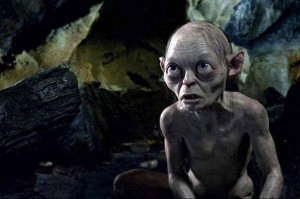 Musical contributions from Howard Shore are lovely yet the only new theme that presents itself as a centerpiece is the Dwarves’ song of the Lonely Mountain, an instant favorite since the teaser trailer first appeared. The design and weapons and effects team at WETA has again come through with a miracle of Middle-earth. I can see and feel Alan Lee and John Howe all over the place. The design of Erebor is just nuts. I loved it.
Musical contributions from Howard Shore are lovely yet the only new theme that presents itself as a centerpiece is the Dwarves’ song of the Lonely Mountain, an instant favorite since the teaser trailer first appeared. The design and weapons and effects team at WETA has again come through with a miracle of Middle-earth. I can see and feel Alan Lee and John Howe all over the place. The design of Erebor is just nuts. I loved it.
Just give Andrew Lesnie every industry award there is. Oscar gold was forged by Dwarves just for him and his stunning camerawork. The unusual saturation of golden colors stark against shadows in a wide battlefield was memorable. My favorite shot of the film: the camera follows the fireplace in Bag End, pans up to the mortar chimney outside, surrounded by grass growing over The Hill, while flickering embers rise up into the midnight sheen and disappear against a vault of stars. It is such a quiet moment (the film takes only a few), simple and lingering, that somehow it reminded me of the peace given to me by reading Tolkien.
There are moments in the film that work so well, you may find yourself wishing the entire running time had been filled with such “perfectly tuned” bits. Perceptive viewers will realize this HOBBIT screenplay was approached very differently than LOTR. In that Trilogy, they had to trim, edit, and compress Tolkien’s sprawling books into succinctly buttoned-up core moments of drama, moving swiftly on to the next thing. Here however, the writers are doing the opposite – expanding and adding beyond the book. The result feels a bit different, but you’re definitely still in the gorgeous and familiar arms of Tolkien’s Middle-earth, as envisioned by PJ and WETA.
Overall this film is an 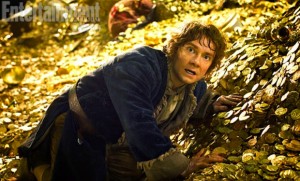 agreeably entertaining affair that methinks might be at a wee disadvantage: having to be constantly compared to the Trilogy before it, thus giving people certain expectations. If you walk in expecting something hewn closer to “The Hobbit” book’s tone, light-hearted and winking, instead of the sturm and drang of LOTR, you’ll quite enjoy yourself. Admittedly the film’s ending feels like a long Second Act, and you’re wondering where the Third Act might be in this narrative; and the answer is “wait until next year.” THE HOBBIT: THE DESOLATION OF SMAUG is already on my mind more than any other film.
agreeably entertaining affair that methinks might be at a wee disadvantage: having to be constantly compared to the Trilogy before it, thus giving people certain expectations. If you walk in expecting something hewn closer to “The Hobbit” book’s tone, light-hearted and winking, instead of the sturm and drang of LOTR, you’ll quite enjoy yourself. Admittedly the film’s ending feels like a long Second Act, and you’re wondering where the Third Act might be in this narrative; and the answer is “wait until next year.” THE HOBBIT: THE DESOLATION OF SMAUG is already on my mind more than any other film.
You know the old adage in Hollywood: “Always leave ’em wanting more.”
Much too hasty,
Quickeam
———————————————————
So here ends my spoiler-free section of the review. From here on forward, I will take a fine-toothed comb to the standout moments. STOP READING NOW IF YOU DON’T WANT SPOILERS.
~
~
~
~
~
~
*Last chance!* Do you want to enjoy the movie fresh on its own terms or not? ……. LAST WARNING BEFORE SPOILER CITY
~
~
~
~
~
~
~
~
Okay here we go. I am happy to report there are long stretches of THE HOBBIT: AUJ directly from the book. I say a full and hearty “Good on ya” to Fran Walsh, Philippa Boyens, and PJ. However, I wonder what is genuinely left of Guillermo del Toro’s material? Regardless, this kind of fidelity to Tolkien is greatly pleasing. It looks like there is apparent care to keep canon in so many compositions and discussions amongst the characters. The fact that Elrond’s conversation about the map’s Moon Letters indicated a precise astronomical date on the Dwarven Calendar in order for the workings to function did not escape my notice. All very rich indeed.
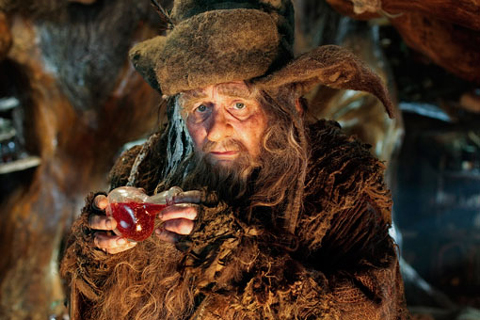 However, there are new things you’ve never read in the original “The Hobbit:”
However, there are new things you’ve never read in the original “The Hobbit:”
(a) Radagast the Brown and the remarkable Bunny Sled
(b) Rhosgobel getting quasi-attacked by spiders
(c) A Ringwraith appearing out of a statue in Dol Guldur
(d) Azog on a vengeance-quest, hunting Thorin all across Eriador
(e) The White Council having an impromptu meeting
(f) The Stone Giants peeling themselves off the mountainside and hurling massive boulders at one another, Thorin & Company spectacularly caught in the madness of it
(g) Slow-motion memories of brutal war of the Dwarves and Orcs outside Moria
(h) Elrond reading Moon Letters through a glass block table in Rivendell’s waterfall
(i) Great waves of Erebor refugees wandering weary miles (including visible Dwarf Women!)
(j) Once-noble Thorin sadly working cheap metal-craft in some nowhere town
(k) The extravagantly appointed city of Dale, looking like the richest Renaissance Faire ever, times 20!
(l) Giant swinging-from-the-ceiling Dwarf Hammers ponderously slamming together over a blacksmith’s head, sparks a-flying
(m) The Great Goblin sending his evil scribe in a basket contraption to go inform other Orcs about their captives
(n) Evidence of farmers or other inhabitants anywhere near the Trollshaws
(o) Gandalf sending a moth to inform the great Eagles of their fiery predicament
Almost to letter “p” in the alphabet. And since this movie is 2 hours, 47 minutes long you will certainly face having to “p” during your screening, so I’ll spare you the extra “p.”
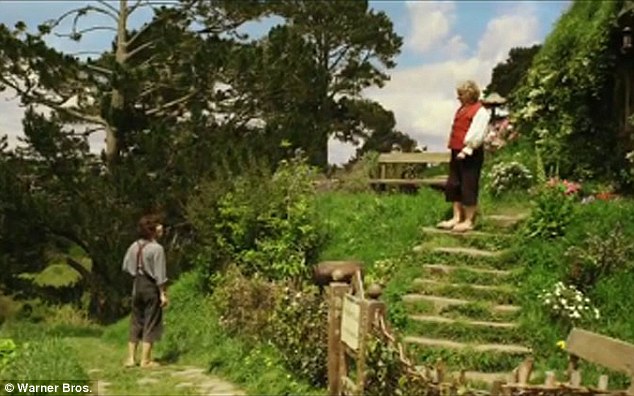 So you can see there are many departures from the book. Do they sit well overall? Do they feel natural to, and therefore part of, this Middle-earth? For the most part I say, “Hell yeah, this is good stuff, right from Tolkien!” Especially intriguing is Old Bilbo (the endearing Sir Ian Holm) delivering the tragic history of Erebor in the opening prologue. The design of the Great Gate of the Lonely Mountain, and the one dragon’s leg we do get to see, thrilled me to no end.
So you can see there are many departures from the book. Do they sit well overall? Do they feel natural to, and therefore part of, this Middle-earth? For the most part I say, “Hell yeah, this is good stuff, right from Tolkien!” Especially intriguing is Old Bilbo (the endearing Sir Ian Holm) delivering the tragic history of Erebor in the opening prologue. The design of the Great Gate of the Lonely Mountain, and the one dragon’s leg we do get to see, thrilled me to no end.
However, not all of it works for me 100%. It feels a bit strange having Azog show up as a “constant pursuer.” He and his Orc pack are analogous to the Black Riders in FOTR closing in on Arwen and Frodo. Then Radagast shows up offering himself as a distraction, in a chase set-piece meant to boost up a rather relaxed storyline. I mean, come on, it’s about 1 hour, 40 minutes into the flick before we reach Rivendell. I noticed a few places where the writers strained to inject some energy into the narrative; and Azog becomes the instrument of that, without any other major villain in the film. We certainly do have to wait a long year for Smaug to show up in full glory in the next installment.
One more thing that bothered me was Radagast being able to see a manifestation of a Nazgûl spirit, exactly as Frodo had seen them in FOTR. Given that a writer of speculative fiction always must follow strict rules of magic (or science fiction) when inventing a secondary world, like Tolkien did, this bit might qualify as a mistake in continuity. In the original LOTR Trilogy, Frodo could only see the Nazgûl in their frightening spectral form, as Kings of Old, when he put on the Ring (remember Weathertop?). But here one of them manifests right out of a Dol Guldur statue, carrying a Morgul Blade, and Radagast sees it plain as day – then flees for his life. The animal-friendly Brown Wizard is not wearing any Ring of Power, is he, so how can he see them like that? I’m scratching my head about that one, but this is what we geeks think about. Hehehehe. Ephemera of Tolkien clashes with ephemera of Jackson.
Especially pleasing is the brief appearance of Lee Pace as the Elven-king Thranduil, father of Legoloas Greenleaf. Such a striking tableaux is created where Thranduil is first seen, resonating a bit of a Hayao Miyazaki feel. For a second I felt I was seeing Ashitaka riding his red elk in PRINCESS MONONOKE.
The appearance of Sir Christopher Lee as Saruman the White, before he becomes a traitor, is also immensely gratifying. This legendary actor is one of my favorites, the greatest veteran of cinema with more film credits than any other actor (by far), and he brings us just the right shade of “might-be-evil-might-be-good.” They designed his beard just a little bit darker, a nice touch, but you can see how Saruman is trying to coax the White Council into apathy, which rings quite true to the material in the Appendices of ROTK.
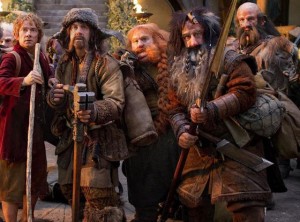 I wish that more than half of the Dwarves could have had dialogue. The lion’s share is all Thorin and Balin (a terrific Ken Stott), but come on! Stephen Hunter, as Bombur, had not a single line at all. Not one spoken word. Dori, played by the wonderful Mark Hadlow, has all but two sentences onscreen. That’s it. I was hoping Óin (John Callen) would have something pithy to say about his ear horn, but alas. Kíli (Aiden Turner) and Fíli (Dean O’Gorman) get all the good stuff in the Troll sequence, Bofur (James Nesbitt) gets a wonderful moment of dialogue right before the Goblin-town scene. Wishful thinking to get more than three or four lines out of Gimli’s father, Glóin (Peter Hambleton)! All of these personalities are definitely a lot to squeeze in, but since we’ve got 3 hours of breathing space, I figured something from all of them would be given a chance to shine through, or just poke up into the light, for a bit.
I wish that more than half of the Dwarves could have had dialogue. The lion’s share is all Thorin and Balin (a terrific Ken Stott), but come on! Stephen Hunter, as Bombur, had not a single line at all. Not one spoken word. Dori, played by the wonderful Mark Hadlow, has all but two sentences onscreen. That’s it. I was hoping Óin (John Callen) would have something pithy to say about his ear horn, but alas. Kíli (Aiden Turner) and Fíli (Dean O’Gorman) get all the good stuff in the Troll sequence, Bofur (James Nesbitt) gets a wonderful moment of dialogue right before the Goblin-town scene. Wishful thinking to get more than three or four lines out of Gimli’s father, Glóin (Peter Hambleton)! All of these personalities are definitely a lot to squeeze in, but since we’ve got 3 hours of breathing space, I figured something from all of them would be given a chance to shine through, or just poke up into the light, for a bit.
I have one more gripe: the Eagles don’t talk, neither do the spiders (yet). All the inner workings of Gandalf’s relationship with these majestic creatures is still unknown. The Eagles therefore get no narrative context of who they are or why they are motivated to assist. I believe the whole sequence was gorgeously animated and scored, especially the majestic way one Eagle gently picks up a wounded Thorin, but I sorely wish that we had heard the Eagles talk this time.
There’s more to come and that’s the bottom line. Two more films – and perhaps when we are all done – we’ll be able to judge all six films of a piece.
The best parts of THE HOBBIT: AUJ are meant to satisfy fans of the books, that is evident. If you’re a Ringer fan like I am, you’ll love when the filmmakers’ linger in the comfortable nooks and corners of Tolkien’s world. This material is tailor-made for you. The payoff is given in small, savory moments that add up to a truer whole.
Much too hasty,
Quickbeam
~~~~~~~~~~~~~~~~
Clifford Broadway, contributor and Senior Staff to TheOneRing.net, hosts the weekly video chat show TORn TUESDAY, featuring live chat with special guests and fellow Ringer fans. Follow Quickbeam on Twitter @quickbeam2000
Follow TheOneRing.net @theoneringnet
Like us on www.facebook.com/theoneringnet


